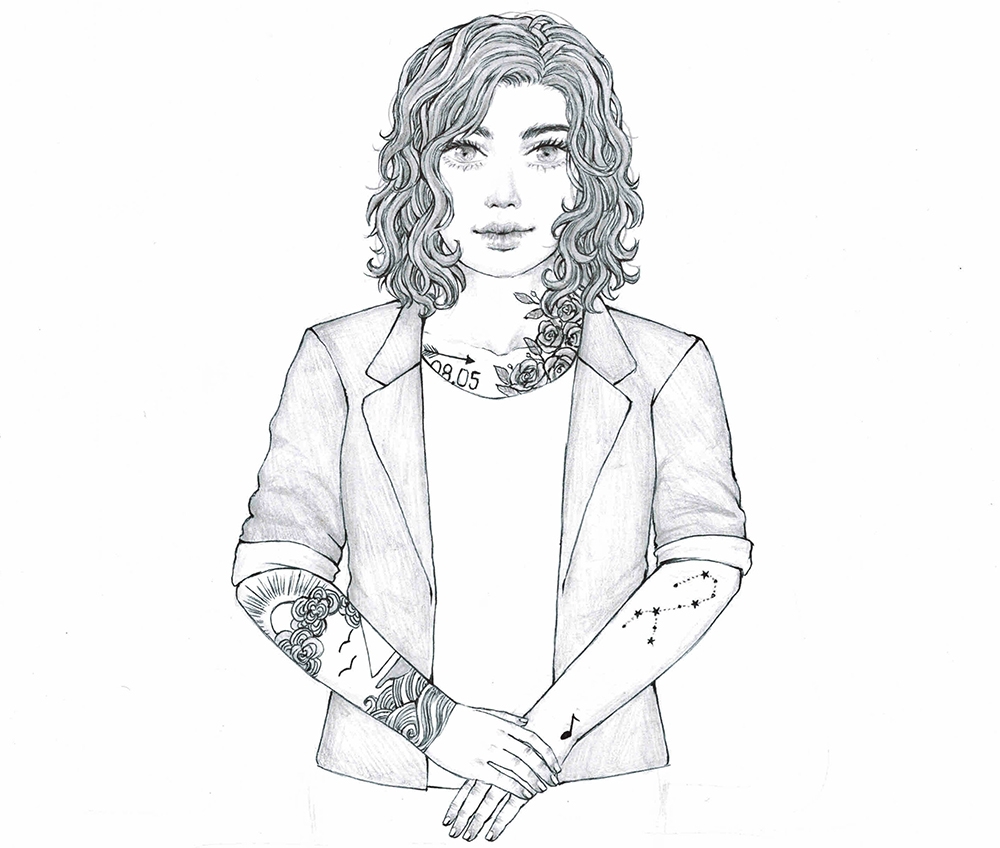Arfi Hagiyusuf | Features Editor
Featured illustration: Millennials are encouraged to think twice before coming to an interview. | Branavi Balendran
There are many different ways to express individuality, from piercings to tattoos or even wacky hair colours. You may have heard anecdotes about how a visible tattoo or an unconventional piercing can lower job prospects. Surely by 2016 society’s views have changed. Tattoos in particular, likely because of their permanent nature, are highly contentious. There is a cloud of stereotypes surrounding tattoos, including associations with gangs and criminals, a lack of education and immaturity. After all, 73 per cent of people get their first tattoo between the ages of 18 to 22, according to a Pew Research Center report. A study by professor Viren Swami of Anglia Ruskin University concludes that people with tattoos are likely to be more verbally aggressive.
Despite these connotations, tattoos are becoming more widespread and increasingly more acceptable. According to Pew Research Center, 40 per cent of millennials have tattoos, and KITT University found that 86 per cent of young professionals did not believe that piercings and tattoos reduced their chances of finding a job. However, would employers agree?
“I have two tattoos on my arm and I have had a few interviews when I was younger where I would naively wear a shirt that would show my arm and I would feel stares. Although I don’t think my tattoos have ever stopped me directly from getting a job yet, I do feel like if I were to show them off at a job interview now, it could have a negative indirect impact,” says Simran Singh, a second-year psychology student.
Job interviews are essentially judgements based on first impressions. “Humans persistently make biased decisions based on minimal, misleading and misunderstood first impressions,” Harvard Business School psychologist Amy Cuddy told the Sydney Morning Herald. According to her book, Presence, when meeting someone for the first time, we assess whether we can trust and respect them. Sadly, we use physical indicators, including tattoos, piercings and hairstyles, to answer these questions and this can have serious implications on one’s level of employability.
“I’ve been to job interviews that right of the bat, before even speaking, I knew I wasn’t going to get the job. It is really obvious when people judge you solely of your look, especially in a job or interview setting. There is something crippling about the fact that you have no power in influencing a decision when it’s based only on your outer appearance,” says Mariam Addow, a third-year biology student.
Employers are not allowed to discriminate against potential or current employees based on the 11 areas covered in the Canadian Human Rights Act, including race, nationality, religion, age, sexual orientation, disability or a pardoned conviction. But there is no law that explicitly states employers cannot discriminate against other factors, such as tattoos, piercings or hairstyles.
Despite widespread changing attitudes, employers’ actions can be swayed by customer expectations. A study conducted by salary.com indicates that 39 per cent of those surveyed believe employees with tattoos and piercings reflect badly on the employer. Similarly, 42 per cent feel visible tattoos are not appropriate in the workplace.
“When you’re working frontline or in customer service, you’re representing the organization that you work for. Every interaction reflects on the organization and so it is important to be mindful of how you are representing them,” says Sulieka Jama, Toronto Community Housing manager.
There are exceptions to these norms. Companies like Starbucks, MAC, Forever 21 and Whole Foods allow their employees to openly have these expressions of individuality on them with a less strict dress code.
Society has made major strides when it comes to allowing different forms of expression in the workplace, but there is still work to be done. Tattoos are no longer associated with gangs, piercings are no longer considered a rebellious teenage act and some unconventional hairstyles do not evoke name-calling—for the most part. Society is becoming increasingly more open-minded, yet our personal outward expressions can still hinder job prospects.
In particular, there have been a number of incidents where individuals have been reprimanded for having hairstyles deemed inappropriate in the workplace. The suitability of styles like braids and afros in the workplace is still a highly contentious topic.
Cree Ballah, a former Zara employee, recently quit her job after being told that her box braids were not a clean professional look. Ballah told CBC that she felt humiliated and embarrassed when she was singled out and while the managers prodded with her hair.
“My hair type is also linked to my race [and my] hair type is out of my control and I try to control it to the best of my ability, which wasn’t up to standard for Zara. I felt like it was direct discrimination against my ethnicity in the sense of what comes along with it,” said Ballah.
This wasn’t an isolated incident, and with similar cases being made against employers across Canada, it is clear that there are still strides that need to be made in the workplace.
As millennials, job hunting is already an uphill battle, and physical features and forms of expression should not be an indication of our qualifications, education or professional behaviour. There’s no doubt that societal views are changing, but these changes must be reflective in practice for them to be truly impactful.
With files from Ryan Lall




